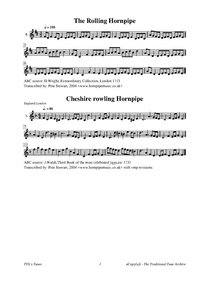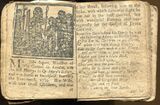Template:Pagina principale/Vetrina: Difference between revisions
No edit summary |
No edit summary |
||
| Line 8: | Line 8: | ||
|f_played_by=[https://www.youtube.com/channel/UCREcb3llNYmclT-nIYl2ayw Les Harpies, Freddy Eichelberger, Odile Edouard] | |f_played_by=[https://www.youtube.com/channel/UCREcb3llNYmclT-nIYl2ayw Les Harpies, Freddy Eichelberger, Odile Edouard] | ||
|f_notes=Colonial Children (1902). | |f_notes=Colonial Children (1902). | ||
|f_caption=The principle amusements of the young men were wrestling, running and jumping, or hopping three hops. Dancing was considered an important thing to know. Dancing to step-tunes, such as Old Father George, Cape Breton, High Betty Martin and the Rolling Hornpipe were favorites. | |f_caption=The principle amusements of the young men were wrestling, running and jumping, or hopping three hops. Dancing was considered an important thing to know. Dancing to step-tunes, such as Old Father George, Cape Breton, High Betty Martin and the '''Rolling Hornpipe''' were favorites. | ||
|f_source=[https://www.youtube.com/watch?v=d-QGwle9y6k Youtube] | |f_source=[https://www.youtube.com/watch?v=d-QGwle9y6k Youtube] | ||
|f_pix=420 | |f_pix=420 | ||
Revision as of 12:21, 17 March 2024

Played by: Les Harpies, Freddy Eichelberger, Odile Edouard
Source: Youtube
Image: Colonial Children (1902).

"The Rolling Hornpipe" may have had 17th century Cheshire or Lancashire origins, but it received wide dissemination as a country dance and tune(s), albeit in several variations and derivatives that can be seen/heard as "Roaring Hornpipe (The)" (Wales), "Rowling Hornpipe," "Rowland Hornpipe," "Cheshire Rolling Hornpipe," "Oldham Rowling Hornpipe" and others.
There are wide differences between these melodies, yet all seem united by title, purpose and a kind of musical pattern or structure.
"Cheshire Rowling Hornpipe", for example, is in a minor key in Walsh's Third Book, set in 3/4 time with the seventh sharpened in a conventional way, but Wright has it in 3/2 time in a major key (and within the compass of the bagpipes).
John Offord (1985) speculates that the designation as 'rolling' hornpipes in the titles may have to do with not having syncopation in the melodies.
It was imported to the New World and the Rolling Hornpipe as a dance is named in 19th century articles and books as a favorite country dance, particularly among the young.
...more at: The Rolling Hornpipe - full Score(s) and Annotations
X:1 T:Cheshire rowling Hornpipe A:England;London M:6/4 L:1/4 Q:3/4=80 S:J.Walsh,Third Book of the most celebrated jiggs,etc 1731 Z:Pete Stewart, 2004 <www.hornpipemusic.co.uk> with vmp revisions K:Dmin V:1 clef=treble name="1." [V:1] FDFE^CE|D>EF/D/ECc|C2FE/F/GE|FDFE^CE|D3A>GF/E/|D2FE/F/GE|| AFDd>c=B|c3G>FE/D/ |C2FE/F/GE|D>d^c=Bed/c/|d3A>GF/E/|D2FE/F/GE|| fafege|cegcAF|C2FE/F/GE|a/g/f/e/ dg/f/e/d/^c|d3AFD|D/E/FDE/F/GE|]
